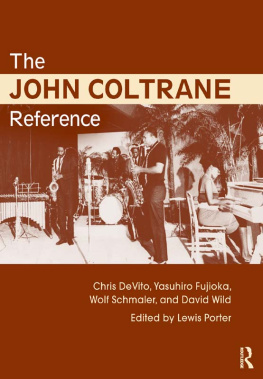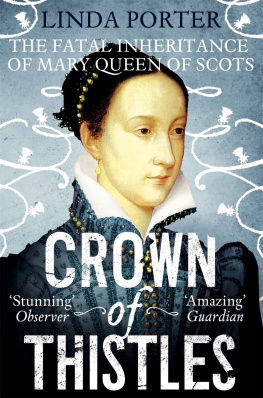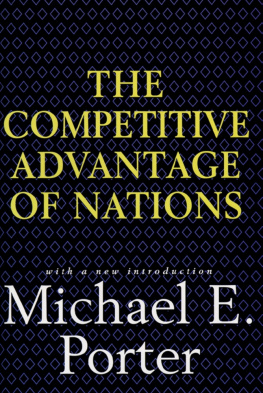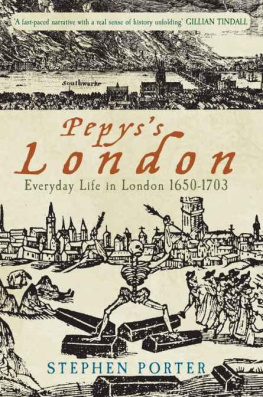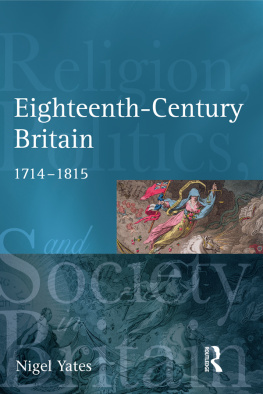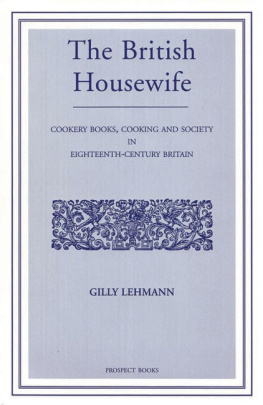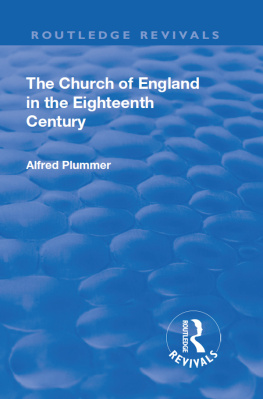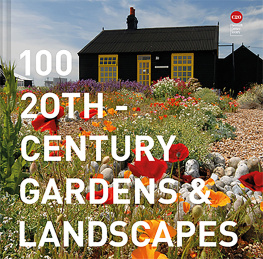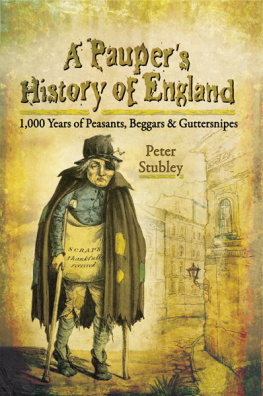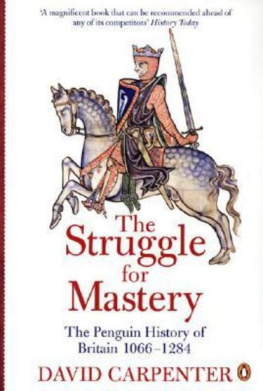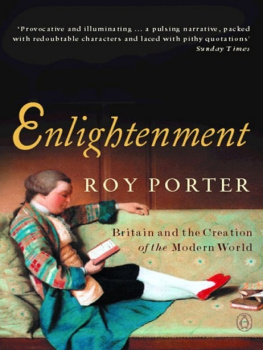Porter - The Penguin Social History of Britain English Society in the Eighteenth Century
Here you can read online Porter - The Penguin Social History of Britain English Society in the Eighteenth Century full text of the book (entire story) in english for free. Download pdf and epub, get meaning, cover and reviews about this ebook. City: Array, Grossbritannien, year: 1991, publisher: Penguin Books Ltd, genre: Art. Description of the work, (preface) as well as reviews are available. Best literature library LitArk.com created for fans of good reading and offers a wide selection of genres:
Romance novel
Science fiction
Adventure
Detective
Science
History
Home and family
Prose
Art
Politics
Computer
Non-fiction
Religion
Business
Children
Humor
Choose a favorite category and find really read worthwhile books. Enjoy immersion in the world of imagination, feel the emotions of the characters or learn something new for yourself, make an fascinating discovery.

The Penguin Social History of Britain English Society in the Eighteenth Century: summary, description and annotation
We offer to read an annotation, description, summary or preface (depends on what the author of the book "The Penguin Social History of Britain English Society in the Eighteenth Century" wrote himself). If you haven't found the necessary information about the book — write in the comments, we will try to find it.
A portrait of 18th century England, from its princes to its paupers, from its metropolis to its smallest hamlet. The topics covered include - diet, housing, prisons, rural festivals, bordellos, plays, paintings, and work and wages.
The Penguin Social History of Britain English Society in the Eighteenth Century — read online for free the complete book (whole text) full work
Below is the text of the book, divided by pages. System saving the place of the last page read, allows you to conveniently read the book "The Penguin Social History of Britain English Society in the Eighteenth Century" online for free, without having to search again every time where you left off. Put a bookmark, and you can go to the page where you finished reading at any time.
Font size:
Interval:
Bookmark:
PENGUIN BOOKS
ENGLISH SOCIETY IN THE EIGHTEENTH CENTURY
Dr Roy Porter is Professor in the Social History of Medicine at the Wellcome Institute for the History of Medicine, London. Recent books include Mind Forgd Manacles: Madness in England from the Restoration to the Regency (Athlone, 1987; Penguin, 1990); A Social History of Madness (Weidenfield and Nicolson, 1987); In Sickness and in Health: The British Experience 16501850 (Fourth Estate, 1988) and Patients Progress (Polity, 1989), both co-authored with Dorothy Porter; Health for Sale: Quackery in England 16601850 (Manchester University Press); Doctor of Society: Thomas Beddoes and the Sick Trade in Late Enlightenment England (Rout-ledge, 1991); London: A Social History (Penguin, 1996); The History of Bethlem (Routledge, 1997), co-authored; The Greatest Benefit to Mankind: A Medical History of Humanity (HarperCollins, 1997); and Gout: The Patrician Malady (Yale University Press, 1998), co-authored. He has also edited, with Jeremy Black, The Penguin Dictionary of Eighteenth-Century History.
THE PENGUIN SOCIAL HISTORY OF BRITAIN
General Editor: J. H. Plumb
Maurice Keen: English Society in the Later Middle Ages 13481500
Joyce Youings: Sixteenth-Century England
Roy Porter: English Society in the Eighteenth Century
Jose Harris: Private Lives, Public Spirit: Britain 18791914
John Stevenson: British Society 191445
Arthur Marwick: British Society Since 1945
Roy Porter
Revised edition

Penguin Books
PENGUIN BOOKS
Published by the Penguin Group
Penguin Books Ltd, 80 Strand, London WC2R 0RL , England
Penguin Putnam Inc., 375 Hudson Street, New York, New York 10014, USA
Penguin Books Australia Ltd, 250 Camberwell Road, Camberwell, Victoria 3124, Australia
Penguin Books Canada Ltd, 10 Alcorn Avenue, Toronto, Ontario, Canada M4V 3B2
Penguin Books India (P) Ltd, 11 Community Centre, Panchsheel Park, New Delhi 110 017, India
Penguin Books (NZ) Ltd, Cnr Rosedale and Airborne Roads, Albany, Auckland, New Zealand
Penguin Books (South Africa) (Pty) Ltd, 24 Sturdee Avenue, Rosebank 2196, South Africa
Penguin Books Ltd, Registered Offices: 80 Strand, London WC2R 0RL , England
www.penguin.com
First published in Pelican Books 1982
Published simultaneously by Allen Lane
Revised edition published in Penguin Books 1991
21
Copyright Roy Porter, 1982, 1990
All rights reserved
Except in the United States of America, this book is sold subject to the condition that it shall not, by way of trade or otherwise, be lent, re-sold, hired out, or otherwise circulated without the publishers prior consent in any form of binding or cover other than that in which it is published and without a similar condition including this condition being imposed on the subsequent purchaser
ISBN: 978-0-14-192647-6
To Jack Plumb
Historians respond to the problems of their time almost without being conscious of the process, and the focus of their study changes with the changing times. In the nineteenth century all countries of Europe and America were preoccupied with the origins of national identity, with the need to forge a living past that would give meaning not only to the present but also to the future: Ranke, Macaulay, Michelet, Bancroft and other great historians of the nineteenth century were so preoccupied. As Britains national identity seemed to be inexorably involved with the evolution of constitutional rights, with liberty, freedom and, particularly, democracy, it is not surprising that an ever growing number of professional historians should devote all their skills and interest to constitutional, legal and political history and that these subjects should dominate university syllabuses when they were first designed in the late nineteenth century.
The First World War, the Great Depression and the economic disasters which followed gave great impetus to the study both of diplomatic and economic history, one generally attracting the conservative, the other the radical historians in the 1920s and 1930s. After the Second World War interest in diplomatic history faded first or, rather, transmogrified itself into International Relations and Strategic Studies. Economic history drifted into a professional morass and developed a confused identity the quantifiers and the econometricians moved in and so did the sociologists, especially American sociologists, hoping to establish an ideology which would refute the Marxist interpretation which had flourished within the realm of economic history.
But the problems of Western industrial society have become much more complex since the Second World War. Fantastic economic growth, and it has been fantastic this last thirty years, has created its own social tensions and, even more important, the very nature of highly industrialized society, apart from its growth has created new conflicts. Institutions which have lasted for ten thousand years, not only in the West but also in the East, have suddenly seemed to be in jeopardy. In the last two decades there has been a mushrooming of interest among historians in the problems of demography, of the nature of the family, of the position of women, children, slaves and servants, of the uses of leisure, of the influence of printing, of the expansion of the arts, of the importance of the images society creates for itself, and of the interpretation of class not in economic but in social terms. A new panorama of social history has spread before the eyes of scholars and led them to subjects which historians of previous generations would have thought of interest only to antiquarians.
Naturally, other forms of history are not dead, even though some of them are corpse-like, but there can be little doubt that the historical imagination, for better or worse, has become intoxicated with social history: for example, the volume of work on death in the last ten years is prodigious and it is matched by the quantity of studies on childhood or marriage.
The danger of social history, which in spite of its present explosion has, in some of its aspects, long roots reaching back through G. M. Trevelyan to Macaulay and Sir Walter Scott, has been the tendency to drift into descriptive history, of how people lived and spent their days with little or no attempt to analyse why their lives, their beliefs, their activities were what they were. Also, the evidence social historians, even very good ones, used in the past, was impressionistic diaries, letters, personal memories, together with material collected from folklorists and antiquarians. Naturally, most of this evidence related to the literate class, until very recent times a modest segment of the nation.
In order to give this material greater rigour, sociological theory, either of Marxist or capitalist bent, has been used and, often, in discussion of death, birth, education of children or the position of women, it has been infused with modern psychological analysis. Although this has given rise to some nonsense, particularly in the history of childhood, it has given the subject, on the whole, greater intellectual weight.
As with economic history, there has also been a powerful movement which has attempted to quantify the evidence of the past in order to give a statistical basis for some of the fundamental questions of social history average size and nature of the family, whether nuclear or extended; the age of marriage for men and women; death rates and ages at death; an attempt has even been made to quantify literacy. Huge mountains of data have been assembled and computers have hummed away merrily at great expense, but the results remain extremely tentative. Before the nineteenth century record-keeping was erratic and its reliability was not easy to test. There is, too, one unknown factor of great importance how many of the population were never recorded at all, neither their births, marriages nor deaths? Indeed, most of the results obtained are easy to criticize and must be treated with considerable scepticism. Even so, generalizations about the family and about its size, about marriage, about bastardy, about age of death, all are firmer than they were and, because they are, help us to understand the life of the country in greater depth.
Next pageFont size:
Interval:
Bookmark:
Similar books «The Penguin Social History of Britain English Society in the Eighteenth Century»
Look at similar books to The Penguin Social History of Britain English Society in the Eighteenth Century. We have selected literature similar in name and meaning in the hope of providing readers with more options to find new, interesting, not yet read works.
Discussion, reviews of the book The Penguin Social History of Britain English Society in the Eighteenth Century and just readers' own opinions. Leave your comments, write what you think about the work, its meaning or the main characters. Specify what exactly you liked and what you didn't like, and why you think so.

